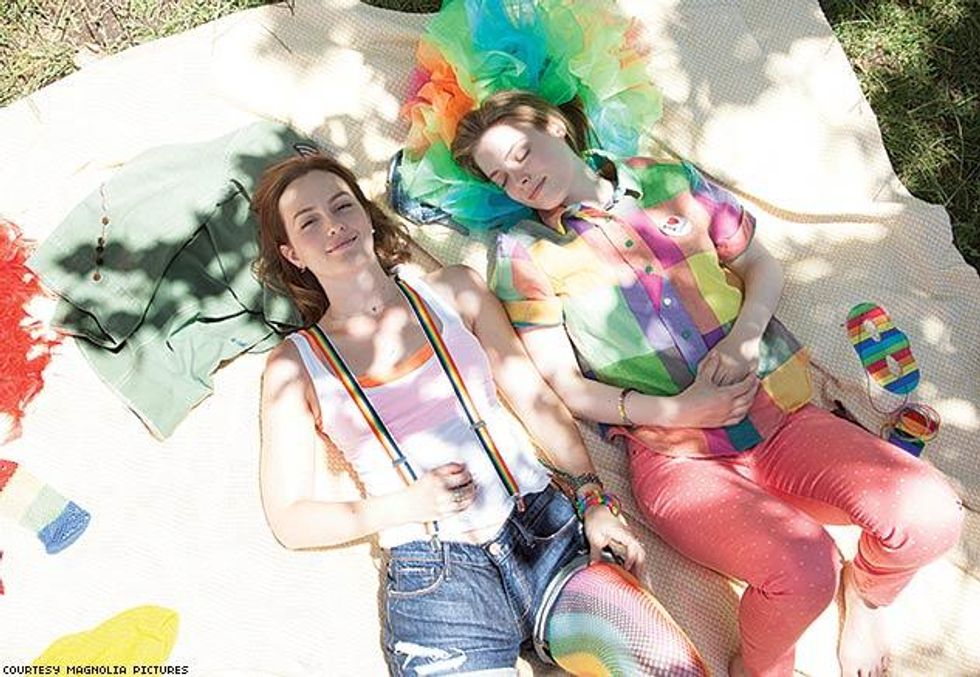 Above: Leighton Meester and Gillian Jacobs
Above: Leighton Meester and Gillian Jacobs
With few exceptions, there is a very specific type of TV show I enjoy: the kind where people die mysteriously and their death needs to be solved via police work or forensics or a witty but sexily misanthropic British investigator. The few exceptions often involve characters (or the actors behind them) who move me in particular ways. I've loved James Spader since Pretty in Pink, so I watch The Blacklist religiously; Eden Shur's Sue Heck is a plucky, I'm-sure-she'll-come-out-as-a-lesbian teen on The Middle who reminds me of the hopefulness and misery of high school, so I watch her even in reruns.
But I wasn't a Gossip Girl fan. The fact that Gossip Girl was aimed at women a decade or two younger than I when it debuted, together with articles like one in The New York Times heralding it as "the first [show] to have been conceived, in part, as a fashion marketing vehicle," did nothing to encourage me to click over to the CW.
You'd have to be under a rock, however, not to see the huge cultural impact the show has had on teenage girls in the last decade (the series ended in 2012). The actresses it catapulted to fame, Blake Lively and Leighton Meester, who played Serena and Blair respectively, could write their own tickets, which is why it's of such importance that Meester, while working on Broadway and recording her surprisingly wonderful debut album, Heartstrings, chose to star in Life Partners, a smart sleeper film that offers the millennial take on lesbian issues, the quarter-life crisis, and the indefinable and nuanced intricacy of female friendships.
"That's what attracted me to the project, the way it captured the complexity of female friendship," Meester says. "Portrayals of women are often very one-dimensional, and often in films and television we're watching two girls who are friends, but their relationship is based on basically talking about dating a guy in the room or just out of earshot. [Women are] better than that, but unless we're doing movies that are written by women and directed by women, we're not going to be able to capture it in a realistic way."
Life Partners was written and inspired by longtime friends Joni Lefkowitz, who is an out lesbian, and Susanna Fogel, who is not. The duo already have a following from starring in their own Web series, Joni and Susanna. Meester was a fan of the Web series and now calls Fogel and Lefkowitz "wonderful people" and great friends. She says she really liked their philosophy and their vibe and their vision, and that being on the Life Partners set "was the best time I've ever had doing a movie or anything."
Meester didn't have to do extra research on positive female relationships. "My friends are made up entirely of really incredible women. I'm a bit of a brag, but all my friends are just beautiful, intelligent, and talented women, and we all are just 100% supportive of each other, and I think that that [sort of female friendship] is underrepresented in film."
The women-centric nature of Life Partners permeates each frame, besting other attempts that may have trod similar territory (TV's Playing House or the film Kissing Jessica Stein) but just left lesbian audiences wanting more.
In American cinema, the kickoff of the film genre of the quarter-life crisis -- the confusing period of time when 20-somethings catastrophize over growing up, committing, or taking responsibility in the real world -- was The Graduate, the 1967 film so frequently referenced in pop culture that "Mrs. Robinson" is all you need to say to evoke it nearly 50 years later.
There have been dozens since, each reflecting its generation, including the Gen-X Brat Pack classic St. Elmo's Fire (a movie my teenage friends and I saw numerous times because at 16 we so identified with the characters), the brutally brilliant Fight Club (another fave), and HBO's Girls (which is changing the portrayal of women on TV with each new episode).
Life Partners upends the quarter-life crisis trope with Meester as Sasha and Community's Gillian Jacobs as Paige, two interdependent women who have been essentially co-pilots in life, even though one is gay and one is not. And though a man is involved, he's a catalyst rather than an obstacle (as in nearly every other film with a lesbian-straight girl-straight guy triangle).
A decade ago this film would have been different, with two clear options: Sasha -- as a schlubby lesbian who has one-night-stands with dumb 20-year-olds, eats junk food, and drinks booze straight out of the bottle -- would either fall in unrequited love with her straight best friend, making for heartbreaking drama at best (call it the Children's Hour trope), or Sasha's character would actually be a man, Ashton Kutcher perhaps, and he and Paige would indeed fall in love at the end (a la A Lot Like Love, When Harry Met Sally..., Made of Honor, and dozens of others).
It's no spoiler to say that neither of those two things happens, and the fact that they don't makes Life Partners refreshing, new, and introspective for a film with a lesbian central character. It will appeal to anyone who likes to eat cake, talk on the phone, and watch The Bachelor with friends. But buried so carefully in the story of women dealing with their friendship when one falls in love with a man and steps over to the grown-up side of the fence faster is a crucial undercurrent. It's a statement that the people of Meester's generation don't care so much about labels, or about who they fall in love with, and are less threatened by gay or bi people than any generation before them. In the same way that a lack of a prejudice can be invisible until noted, this subtext is played out so subtly on-screen that one could easily not realize it's there.
Life Partners starts out at Pride: The scene, filmed at the Long Beach, Calif., LGBT event in 2013, features Paige and Sasha casually wandering through the rainbow-saturated festival, chatting about things young women talk about. It's the kind of scene that in a '90s film (
Clueless, Romy and Michele's High School Reunion, et al.) would have been shot in a mall.
The movie offers other nods to the way diversity is celebrated among millennials today: The lesbian
SNL star Kate McKinnon makes her major-film debut;
American Horror Story's Gabourey Sidibe upends the post-
Precious (male) pundit backlash about her body by playing a sexy and sexually active lesbian; The
OC's nerdy teenager, Adam Brody, plays an affable and unthreatening young man who doesn't bat an eyelash at his girlfriend's intimacy with her lesbian best friend. Because, you know, who cares? To him it's as normal as being left-handed.
"Exactly!" says Meester. "[Being gay is] not a choice. It's not a personality trait. It's just part of [the characters], part of life. I think Sasha has known since she was young that she's gay, and from there on the struggle to find somebody to be with, and the struggle with finding herself and her sort of meaning in life and what she wants to do with her life -- her job, her friendships -- none of it is really impacted by the fact that she's openly gay."
But is it an anomaly, or does
Life Partners -- which premiered at Tribeca and will most likely be a small-scale hit -- reflect a change in cinema for LGBT characters?
Meester hopes LGBT roles will continue to be more common while at the same time less fraught. "[A gay theme] doesn't have to be the main focus of the plot. There can and should be films about gay and lesbian relationships where that's not the main topic of discussion," she says.
After all, she says, "it's just a romantic comedy." In that one sentence, Meester, who was anointed by the CW and the Teen Choice Awards and
Seventeen magazine as the voice of a generation, suggests that a whole new archetype for queer characters in movies doesn't have to come from cultural revolt. Unless, of course, a romantic comedy is the perfect vehicle for revolution.
See the trailer below:


 Above: Leighton Meester and Gillian Jacobs
Above: Leighton Meester and Gillian Jacobs


































































Charlie Kirk DID say stoning gay people was the 'perfect law' — and these other heinous quotes